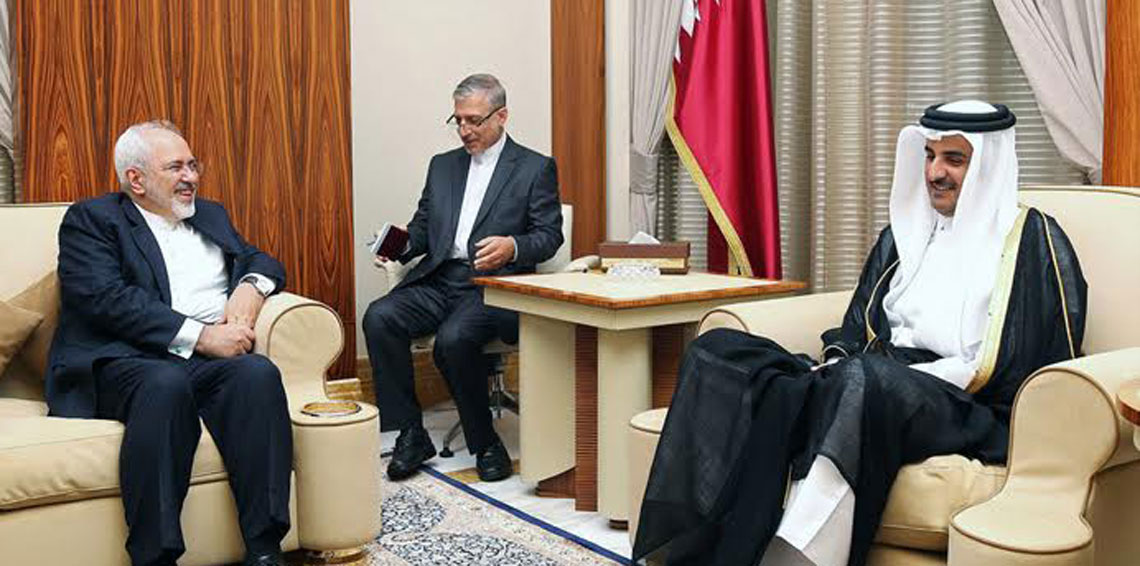Iranian Foreign Minister Mohammad Javad Zarif’s visit to Qatar last week, his second this year, was the latest in a series of diplomatic moves that brought Doha and Tehran closer in recent months.
In the highly transactional sphere of international politics, there are hardly points of no-return. Yet the latest Qatari leap toward Tehran could prove further down the line to have gone a step too far, not only from the perspective of the three Gulf states that cut ties with Doha, but mainly when it comes to Qatar’s own loss of leverage.
By choice or sheer necessity, rapprochements that looked unlikely until they happened have been quite common in recent years between local players and with outside powers as well — a natural consequence of the Middle East’s constant state of turmoil.
Only last week, King Salman’s historic visit to Russia culminated the process of warming ties and aligning interests with Moscow. Two years ago, Riyadh appointed a resident ambassador to Baghdad, the first since Saddam Hussein’s invasion of Kuwait in 1990. This year, Saudi Foreign Minister Adel Al-Jubeir paid a landmark visit to the Iraqi capital.
The collapse of Turkey’s foreign policy — grounded in a deeply ideological, neo-Ottoman outlook as envisioned by its chief architect, former Foreign Minister and Prime Minister Ahmet Davutoglu — also opened the door to fresh diplomatic starts. After a six-year rift going back to the Gaza flotilla incident in 2010, Turkey and Israel reached a deal to normalize relations in June last year.
Mounting tensions between Ankara and Moscow over Syria’s conflict, despite their significant trade ties, peaked after Turkey shot down a Russian military plane over Turkish airspace. President Recep Tayyip Erdogan eventually issued an apology, calling Russia a “friend and strategic partner.” Today, Turkey acts as a close partner of Russia, while its relations with the US have hit an all-time low.
Since the eruption in June of the ongoing diplomatic crisis centered on Qatar, Doha has restored full diplomatic relations with Tehran. Among other Qatari violations of the accord signed by Emir Sheikh Tamim bin Hamad Al-Thani in 2013 are non-interference in the internal affairs of fellow Gulf Cooperation Council (GCC) members and support for extremist groups. These are the same kinds of threatening activities most of Iran’s neighbors accuse Tehran of.
Early last year, Qatar recalled its ambassador in Tehran after the attacks on the Saudi diplomatic missions in Iran. But following sanctions imposed by Bahrain, Egypt, Saudi Arabia and the UAE, Doha restored full diplomatic ties with Tehran in August. A Qatari Foreign Ministry statement read: “The state of Qatar expressed its aspiration to strengthen bilateral relations with the Islamic Republic of Iran in all fields.”
That Qatar and Iran share the North Field, a huge offshore natural gas field that is the key source of Qatar’s massive wealth, is sufficient reason to maintain a basic working relationship with Tehran.
Yet under the previous emir, Sheikh Hamad bin Khalifa Al-Thani, bilateral relations developed significantly. Under his successor Sheikh Tamim, there was the promise of a more balanced foreign policy. But in 2016, that did not prevent Qatar from voting against UN Security Council 1969, which called on Iran to stop its uranium enrichment program. Qatar was the only council member that voted against it.
Despite its GCC membership, the small emirate and Iran have in common a highly populist and disruptive foreign policy, often based on steering trouble abroad by supporting extremist groups of all sorts. Crucially, this is what distinguishes Qatar from Oman, which has tried to maintain an equidistant policy toward Saudi Arabia and Iran.
The talks between the pro-Islamist governments of Qatar and Turkey on the establishment of a Turkish military base in Qatar, which started long before the current diplomatic crisis, were already another sign of Doha’s significant differences with its Arab Gulf neighbors. In June, Erdogan, who calls Sheikh Tamim “brother,” fast-tracked a bill through Parliament to allow Turkish troops to be deployed in Qatar.
Turkey’s growing military umbrella might offer some assurances to Doha, but there is plenty the far more powerful Iranian regime can do to place Qatar in an uncomfortable position. They are still fighting a proxy war in Syria, their interests do not align on every issue, and there will be other crises that will seriously test the relationship.
One of these crises could be the rising tensions between the Trump administration and Israel on the one hand, and Tehran, Iran’s Revolutionary Guard Corps, and the various terrorist groups and militias that Iran backs across the region on the other. The US military base of Al-Udeid, southwest of Doha, could turn from a security guarantee to a problem for Qatar’s leap toward Tehran.








































admin in: How the Muslim Brotherhood betrayed Saudi Arabia?
Great article with insight ...
https://www.viagrapascherfr.com/achat-sildenafil-pfizer-tarif/ in: Cross-region cooperation between anti-terrorism agencies needed
Hello there, just became aware of your blog through Google, and found ...